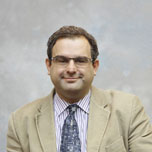Machine Learning and Holistic Sensing for Societal Benefit

September 25, 2020 1:00-2:00 p.m.
Register Here
Dr. David Lary
UTD Physics
ABSTRACT: By definition human health and well being is due to a complex interaction between a myriad factors. A set of interactions for which we do not have a complete theoretical model, but often have an array of relevant data describing many aspects of this complex system. Machine learning is ideally suited for such situations. Over the last two decades machine learning has found may uses in business, science and technology. As a broad subfield of artificial intelligence, machine learning is concerned with algorithms and techniques that allow computers to ‘learn’ by example. The major focus of machine learning is to extract information from data automatically by computational and statistical methods. Over the last decade there has been considerable progress in developing a machine learning methodology for a variety of Environmental Health and Earth Science applications. In this chapter, we will review some examples of how machine learning has already been useful in environmental, biometric, robotic remote sensing and other applications with some likely future directions.
BIOGRAPHY: Prof. David J. Lary received a First Class Double Honors B.Sc. in Physics and Chemistry from King’s College London with the Sambrooke Exhibition Prize in Natural Science, and a Ph.D. in Photochemical Computer Modeling of Atmospheric Chemistry from the University of Cambridge. He is a Professor in the Department of Physics and part of the Hansen Center for Space Sciences. The thread running through all the research is holistic sensing in service of society through the use of machine learning and data driven insights, using observation and automation to facilitate discovery, with a focus in the area of human health. David held positions at Cambridge University from 1991-2001, including being a faculty member and receiving a Royal Society University Research Fellowship. In 1998 David was awarded the first Alon Fellowship in the Department of Geophysics and Planetary Space Science at the University of Tel-Aviv. In 2000 the chief scientific adviser to the British Prime Minister and Head of the British Office of Science and Technology, Professor Sir David King, recommended David to be appointed as a Cambridge University lecturer in Chemical Informatics in the world’s first department of Chemical Informatics. In 2001 David was invited to join NASA for his work on data assimilation as the first distinguished Goddard fellow in Earth Science and stayed at NASA till 2010, receiving six NASA awards for his research and technology development. In 2018 David was appointed a United States Special Operations Command Fellow at SOFWERX by J5, the Futures Mission Directorate of USSOCOM.




